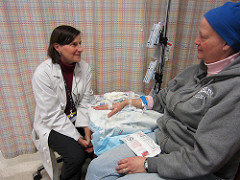After nearly 55 years in a trade embargo, the US has finally begun to mend relations with Cuba. It is no doubt that oil will be at the top of the list for things to trade. A vaccine named CimaVax may also be a priority. In all irony, the country famously known for its rich cigars has also developed a vaccine that combats lung cancer, and you guessed it- the US wants it!
Last month, New York Governor Andrew Cuomo and the Roswell Park Cancer Institute signed a partnership with Cuba’s Center for Molecular Immunology in efforts to develop the lung cancer vaccine in the United States. Currently in Cuba, CimaVax is used as a therapeutic vaccine. Rather than a traditional vaccine that prevents diseases, CimaVax works by stimulating the immune system to attack cancer cells already present in the body. The vaccine carries epidermal growth factor (EGF), a protein that stimulates cell growth, proliferation, and differentiation when bound to epidermal growth factor receptors (EGFR). In order to metastasize, or spread, cancers seize control of EGFR. Therefore, by injecting EGF into the body, the vaccine helps foster the production of antibodies against EGF, the major binding factor of EGFR, and is able to deny cancers the stimulus they require for growth. The Roswell Park Cancer Institute hopes that for this reason, CimaVax can be further investigated as a preventative vaccine rather than its current role as a therapeutic one.
Image Source: Science Photo Library – MOREDUN ANIMAL HEALTH LTD
There is even more potential for CimaVax that the Roswell Park Cancer Institute wishes to discover. As EGF also plays a significant role in many other types of cancers, such as breast, colon, and pancreatic cancer, CimaVax may have a wider range of targets than just lung cancer. However, due to financial shortages, Cuba’s Center for Molecular Immunology has not been able to test the potential of CimaVax as a wide-range cancer vaccine. Thus, the Roswell Park Cancer Institute hopes to take on this task.
Through the partnership between the US and Cuba, researchers in the US will gain access to the results from the clinical trials of CimaVax conducted in Cuba, as well as the toxicity reports of the vaccine. These documents can then be used to apply CimaVax for FDA approval in order for the institute to begin clinical trials themselves. However, it may be a while before the CimaVax can make its way to the US. Although the Obama administration is attempting to normalize ties with Cuba, Congress has yet to lift the trade embargo. Until this happens, collaborative research on the vaccine cannot start out with full force.
Feature Image Source: 20120120 Chemo Nurse and Patient by kbrookes










